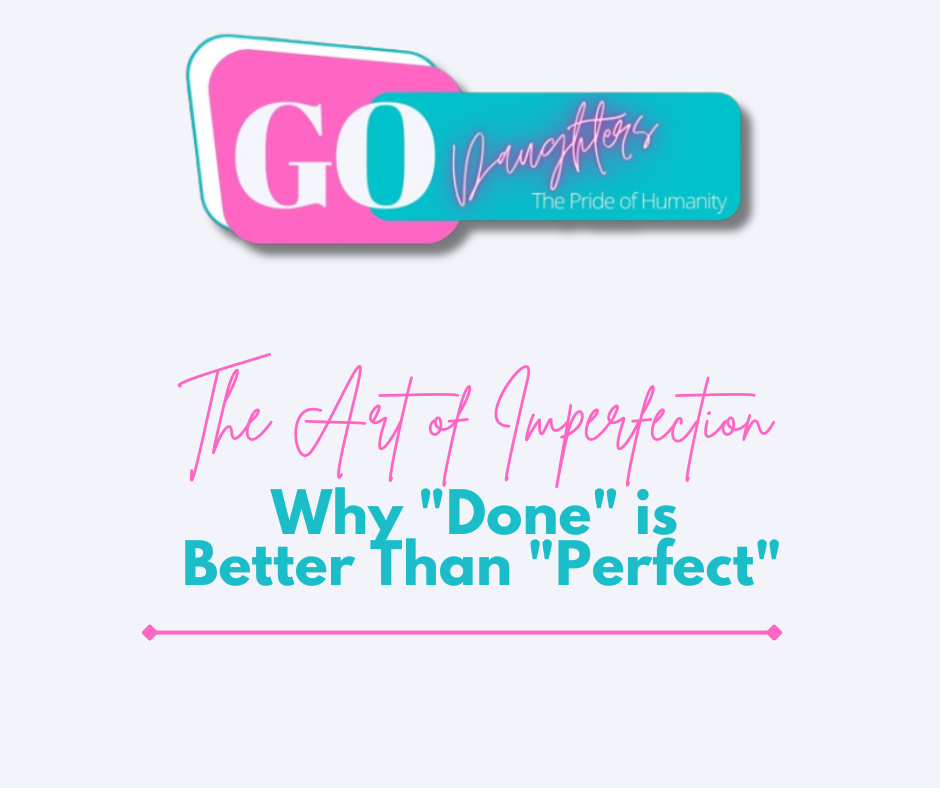
In today’s fast-paced and demanding world, the pursuit of perfection has become a common mantra. Many individuals strive to achieve flawless outcomes in their work, relationships, and personal lives. However, an alternative perspective suggests that embracing the concept of “done” rather than fixating on perfection can lead to greater productivity, personal growth, and overall satisfaction. In this blog, we will explore the idea that “done is better than perfect” and examine the benefits it can bring to our lives.
The Myth of Perfection. Perfection is an elusive and often unattainable goal. The pursuit of perfection can be a double-edged sword, as it often leads to a state of perpetual dissatisfaction and prevents us from moving forward. The truth is that perfectionism can hinder progress, stifle creativity, and contribute to unnecessary stress and anxiety.
Productivity and Momentum. When we prioritize being “done” over achieving perfection, we tap into the power of productivity and momentum. By setting realistic goals and deadlines, we create a sense of urgency and motivation to complete tasks. This approach encourages us to take action and make progress, even if the results are not flawless. By embracing the philosophy of “done,” we become more efficient, allowing us to accomplish more in less time.
Iterative Learning and Growth. Embracing the idea that “done is better than perfect” allows us to adopt an iterative approach to learning and growth. When we focus on completing tasks rather than obsessing over perfection, we open ourselves up to valuable feedback and opportunities for improvement. Each completed project becomes a learning experience, offering insights and lessons that can be applied to future endeavors. Embracing imperfection provides the space for experimentation and innovation, fostering personal and professional development.
Overcoming Fear and Procrastination. Perfectionism often goes hand in hand with fear and procrastination. The fear of failure or not meeting impossibly high standards can paralyze us, leading to inaction and missed opportunities. By shifting our mindset to prioritize completion rather than perfection, we diminish the power of fear and overcome the tendency to procrastinate. Taking imperfect action allows us to build resilience, adaptability, and confidence in our abilities.
Enjoying the Process. One of the most significant benefits of embracing “done over perfect” is the ability to savor the journey rather than fixate solely on the destination. By focusing on progress rather than perfection, we can enjoy the process of learning, growing, and creating. We free ourselves from the constraints of unattainable expectations and allow room for exploration, experimentation, and spontaneity. In doing so, we find joy in the present moment and appreciate the value of incremental achievements.
Conclusion. While the pursuit of perfection may seem appealing, the philosophy of “done is better than perfect” offers a refreshing perspective on life and work. By prioritizing completion, we unlock our potential for productivity, personal growth, and fulfillment. Embracing imperfection allows us to overcome fear, savor the process, and build a resilient and adaptive mindset. So, let us embrace the art of imperfection and celebrate the beauty of being “done” rather than striving for an unattainable “perfect.”




